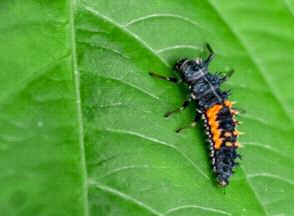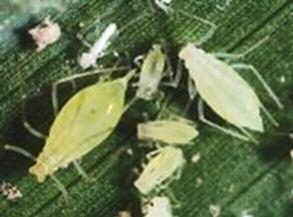If you garden long enough, you will be introduced to aphids. They make their presence known in early spring and can become a nuisance at any time during the summer or fall. Aphids attack new buds, leaves, and shoots of bushes and flowers. Whenever you see twisted, curled leaves and stems, yellowed leaves, stunted or poor plant growth, look closely at the leaves affected.
Aphids are pear-shaped insects 1/16 to 1/8” long that can be green, brown, yellow, gray, or even red. They will be along the stem, inside the flower, and especially on the underside of the leaf. They are found on most plants in small numbers but don’t cause enough damage to treat them until their numbers become high. They can be ignored until they become so numerous they affect the health of the plant, damage the beauty of the flowers, or the produce you hope to eat.
LIFE CYCLE—Most aphids reproduce asexually with female aphids giving birth to live nymphs, immature aphids. They go through several stages before becoming adults and there can be many generations of aphids in one year. Occasionally, winged aphids are produced, usually when their food supply (your plants) is low. They can then fly to another food source. In the fall, male aphids are produced and mate with the females. The female lays eggs that live through the winter in the leaf cover on the ground. In the spring, the eggs hatch and the life cycle resumes.
A good practice is to check your plants regularly throughout the growing season. I try to “scout” about once a week. If you do this you can catch aphids and treat them before they cause extensive damage. Check the new growth and the undersides of leaves, especially the ones that touch the ground.
There are two very easy things to do to reduce potential sites for aphids in your garden. The first is to remove last year’s leaf cover from your garden or till it under the ground. The second thing is to remove weeds where they hide. Another tip: Do not over fertilize your plants, especially with nitrogen (the first number listed on fertilizers). The aphids prefer the new, tender growth the nitrogen stimulates.
A high-pressure water spray will physically knock off aphids and is my preferred way to treat aphids. Even a good rainstorm can knock them off your plants. For years I assumed they would climb right back up the plant but they don’t. You may miss some of the aphids with the spray so go back and repeat it if needed. Any aphids left will be devoured by the beneficial insects that remain because you have not killed them with insecticides.
Natural enemies of the aphids are lady bugs (beetles), lace wings, parasitic wasps, and syrphid flies. The lady beetles have a larva that can devour more aphids than the adult lady beetle but is often killed because it looks like a “bad bug”. I am including a picture of it in the article so you can be on the look-out for it and let it live.
If the aphids damage is severe, you may want to consider using an insecticide. There are several insecticides that are low risk to people, beneficial insects, and the environment.
Neem or azadirachtin” is a plant-based pesticide that discourages aphid feeding. It does not kill aphids quickly but they quit feeding and die.
Insecticidal soap and horticultural oil will kill aphids but only if the spray contacts them. This means the top and bottom of leaves must be sprayed to kill the aphids.
You might also see a sticky, shiny product coating leaves where aphids have been. This is called Honeydew and is the waste product from the aphids feeding. It can also coat cars and lawn furniture leaving a sticky mess. This can be removed with dish detergents and tar removers but test it on a small portion of the surface to be sure it does not cause more damage. On plants, the Honeydew can encourage the growth of Sooty Mold. This is a fungus that causes dark, fussy blotches on leaves, branches, and fruit. I have a lemon tree that frequently has black area. It does not affect the fruit but it wouldn’t win a ribbon at the fair.
Enjoy your summer and your garden!
Edith Iwan is a Master Gardener who lives and works in Thoreau. As a Master Gardener she assists the County Cooperative Extension Service in providing accurate, research- based gardening information to county residents. If you have any gardening questions, please call the NMSU Cibola County Extension at 505-287-9266 or NMSU McKinley County Extension at 505-863-3432


